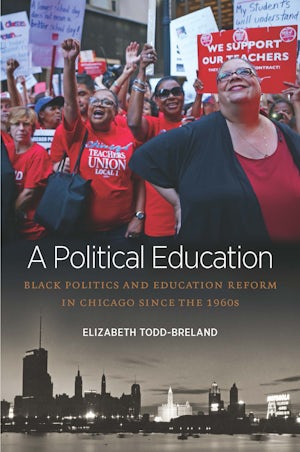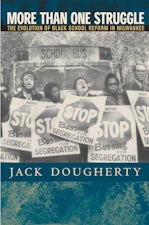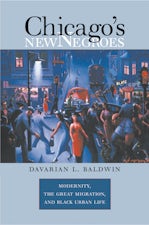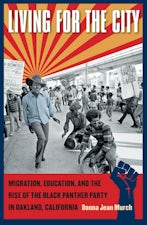A Political Education
Black Politics and Education Reform in Chicago since the 1960s
By Elizabeth Todd-Breland
344 pp., 6.125 x 9.25, 19 halftones, 2 maps, notes, bibl., index
-
Paperback ISBN: 978-1-4696-4658-9
Published: October 2018 -
E-book EPUB ISBN: 978-1-4696-4659-6
Published: October 2018 -
E-book PDF ISBN: 979-8-8908-4890-1
Published: October 2018 -
Hardcover ISBN: 978-1-4696-4657-2
Published: October 2018
Justice, Power, and Politics
Buy this Book
- Paperback $32.50
- Hardcover $99.00
- E-Book $19.99
For Professors:
Free E-Exam Copies
Awards & distinctions
2019 Pauli Murray Book Prize, African American Intellectual History Society
2019 Outstanding Book Award, American Educational Research Association
Co-winner of the 2018 Kenneth Jackson Award, Urban History Association
Honorable Mention, 2019 Liberty Legacy Foundation Award, Organization of American Historians
Honorable Mention, New Scholar's Book Award, Division F, American Educational Research Association
Shortlisted, 2019 Museum of African American History Stone Book Award
Elizabeth Todd-Breland recovers the hidden history underlying this battle. She tells the story of black education reformers' community-based strategies to improve education beginning during the 1960s, as support for desegregation transformed into community control, experimental schooling models that pre-dated charter schools, and black teachers' challenges to a newly assertive teachers' union. This book reveals how these strategies collided with the burgeoning neoliberal educational apparatus during the late twentieth century, laying bare ruptures and enduring tensions between the politics of black achievement, urban inequality, and U.S. democracy.
About the Author
Elizabeth Todd-Breland is assistant professor of history at the University of Illinois at Chicago.
For more information about Elizabeth Todd-Breland, visit
the
Author
Page.
Reviews
"Recounts [Chicago's] educational history in vivid detail." —New York Review of Books
“Todd-Breland skillfully establishes the major activists and players in the major movements and uses their biographies to illustrate broad context, changing social currents, and the shifts in power and discourse over time. . . . [Her] clear-eyed yet sympathetic portrayal of the movement is a vital and refreshing approach.”—South Side Weekly
“Todd-Breland’s critically acclaimed book . . . is especially impressive in its fluent engagement with numerous strands of the historical literature. A Political Education not only engages with but also contributes to the fields of urban history, Black History, labour history, women’s history, educational history, political history, and intellectual history. . . . It is precisely because the book is about making connections and showing continuity that Todd-Breland can masterfully take her readers around a nebula of educational reform movements.” —Historical Studies in Education
"This is a brilliant and necessary exposé of a collision that we all know too little about. Using Chicago as a case study, Elizabeth Todd-Breland shares the devastating collision between Black community-based education reformers and corporate education reformers since the 1960s. Black education organizing comes alive— and fights on and on against all odds— in this expertly framed and vividly told book." —Ibram X. Kendi, National Book Award-winning author of Stamped from the Beginning
"This insightful, astute, sweeping history offers an extraordinary account of black politics and advocacy regarding educational reform and justice over the last half century. It offers a rich, nuanced, deeply researched case study of one major American city, and yet its findings and major themes have national significance. Capturing a range of voices and perspectives in an engaging and cohesive narrative, it is the best study of African Americans' relation to neoliberalism by any historian that I am aware of." —Martha Biondi, Northwestern University
"For half a century Chicago, the third largest city in the United States, has played an outsized role in the ongoing debates concerning race and public education. Elizabeth Todd-Breland is the first historian to weave together those decades of reform and retreat and reform again. Todd-Breland brilliantly articulates the dynamic interplay of municipal and state institutions in combination with the actions of ordinary Black women, students, and teachers to portray the richness and complexity of the struggle for the right to a decent public education. Deeply researched, sharply argued and beautifully narrated, Todd-Breland demonstrates the centrality of Chicago in comprehending the tumultuous history of public education in the United States." —Keeanga-Yamahtta Taylor, author of From BlackLivesMatter to Black Liberation




